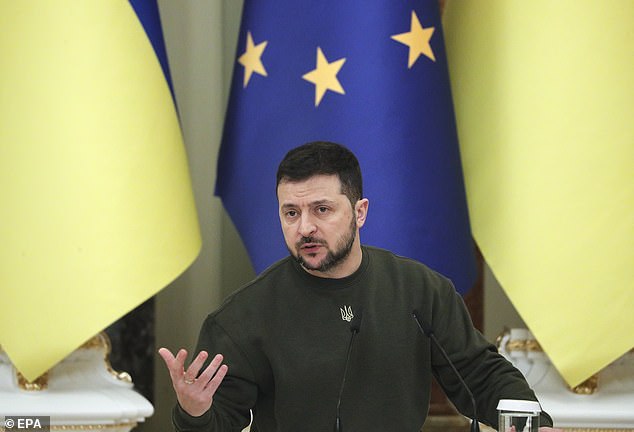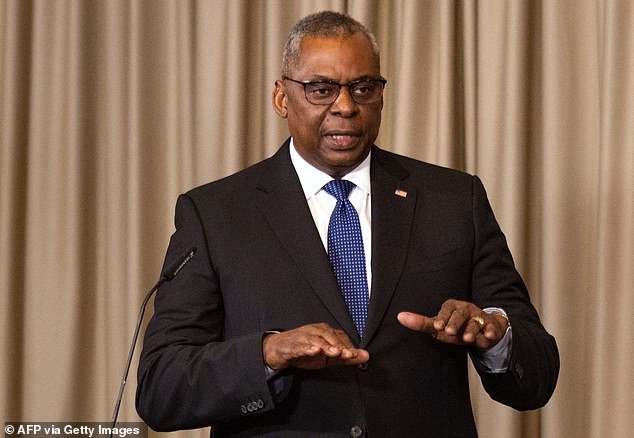UK praised for sending Challenger 2 tanks to Ukraine as Germany drags its heels on Leopard 2
>
UK praised for sending Challenger 2 tanks to Ukraine… while Germany delays donating Leopard 2, with final decision possibly still weeks away
Britain was lauded last night for its decisive commitment to send battle tanks to Ukraine.
As Germany continued to drag its feet following suit with its own military equipment, the US saluted the UK for its leadership.
Berlin’s reluctance to allow its main battle tank, the Leopard 2, to join the fight against Russia has exposed cracks in NATO.
But US Defense Secretary Lloyd Austin said this was a “defining moment for Ukraine’s ability to defend itself” and praised Britain for its leadership in committing to send 14 Challenger 2s.
Berlin’s reluctance to allow its main battle tank, the Leopard 2, to join the fight against Russia has exposed cracks in NATO.
He added: ‘The UK has announced a major donation of Challenger 2 tanks. We congratulate our British allies on this decision.’
Despite pleas from Ukrainian President Volodymyr Zelensky for the Leopard 2s, Berlin has refused to send them. He has also said that other NATO states that use the tanks cannot give them to Ukraine without his approval.
But after crisis talks between NATO defense ministers yesterday, Germany’s position appeared to soften as it said it would prepare its Leopard 2s for rapid deployment if a political deal is reached and signaled that its allies could use theirs. to train Ukrainian tank crews.
However, the final decision could still take weeks, according to German Defense Minister Boris Pistorius.
He spoke after talks with British Defense Secretary Ben Wallace yesterday at the US military base at Ramstein amid concerns that indecision over tanks threatens to compromise Ukraine’s military planning ahead of a spring offensive. .

Despite pleas from Ukrainian President Volodymyr Zelensky for the Leopard 2s, Berlin has refused to send them.
In tense talks, with many NATO defense ministers imploring Germany to make a decision on the Leopard 2 issue, German officials repeatedly pleaded for time, according to sources close to the negotiations.
Germany yesterday announced a £1 billion military aid package for Ukraine. Overall, it is the third largest equipment supplier to Ukraine, behind the UK and the US.
It is sending Marder combat vehicles and guided missiles, but the tank shipment has divided public opinion, with a narrow majority of Germans opposed to giving up the Leopard 2.
In a push for Ukraine, Poland said last night it was “convinced” NATO would agree to send German tanks. Speaking at the Ramstein defense conference, Polish defense minister Mariusz Blaszczak said: “This hope comes from the fact that ministers from 15 countries met on the sidelines of today’s conference and we discussed the matter.”

US Defense Secretary Lloyd Austin said this was a “defining moment for Ukraine’s ability to defend itself” and praised Britain for its leadership in committing to send 14 Challenger 2s.
Mr. Austin emphasized that NATO remains united in its support for Ukraine.
He also offered his support to Germany, saying: “Germany is a trusted ally and we will continue to have a great relationship with Germany and Germany will continue to provide leadership.”
Asked if he was disappointed by the delays in the Leopard 2, Austin added: “It’s not about one platform.” Our goal is to provide Ukraine with the capacity it needs in the short term.”
Ukraine has said it needs 300 tanks to break through the Russian front line.
Marina Miron, from King’s College London’s defense studies department, said the tanks are useful but many factors need to be taken into account.
These include how many tanks will be shipped, what condition they are in, how Ukrainian crews will be trained, when the tanks will be delivered, and how they will be kept supplied.
Sending tanks is “more of a political gesture” than something that will change the face of the war, Miron said.
